#1.2.6
Explore tagged Tumblr posts
Text
Bandai Releases Tamagotchi Uni Version 1.2.6 Update

Another update is here! Bandai has released Tamagotchi Uni version 1.2.6 via an over-the-air software update. This update, like previous updates, increases the Tamagotchi Uni fun by introducing a new Tamaverse feature, updated death screen, and the next Tama Arena event, Bunny Jump!

First, 1.2.6 will bring a new referesh button when selecting the Tamaverse button on the main menu of the Tamagotchi Uni. Under No, you will see a refresh icon which will allow you to refresh Tamagotchi characters in the Tamaverse once per day. Please note the if auto updates are on, or if you are participating in an event at the Tama Arena, you will not be able to refresh characters manually.

Second, there's an updated death screen on the Tamagotchi Uni. On death screen you will not only see the ghost, but you'll also see arrows point down to the "A" and "C" buttons guiding you to hold them down together to hatch a new egg instead of using the reset button. The guide has been added to help everyone understand the above operation.
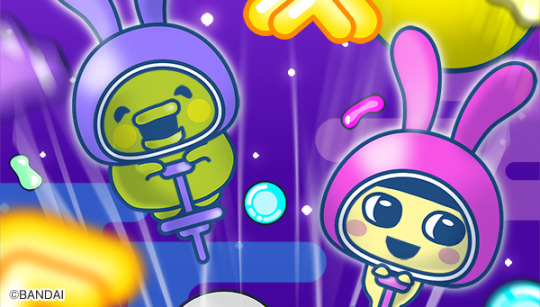
Third is Bunny Jump is the next event that will be hosted at the Tama Arena in the Tamaverse for the month of September. You’ll be able to complete with other Tamagotchi Uni characters around the world to win prizes, just like the Tama Racing event back in August.


In Bunny Jump, you’ll choose between either team peach, or team grape, and complete to see who can jump tot eh highest place. Similar to Tama Racing, you’ll have the opportunity to play once per day, but also practice as many times as needed prior!
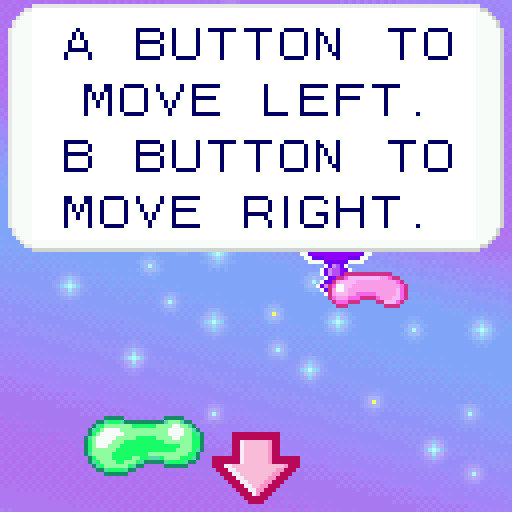

Once the game starts, your Tamagotchi character will begin jumping. Jump to the left by pushing he “A” button, and jump to the right by pushing the “B” button.
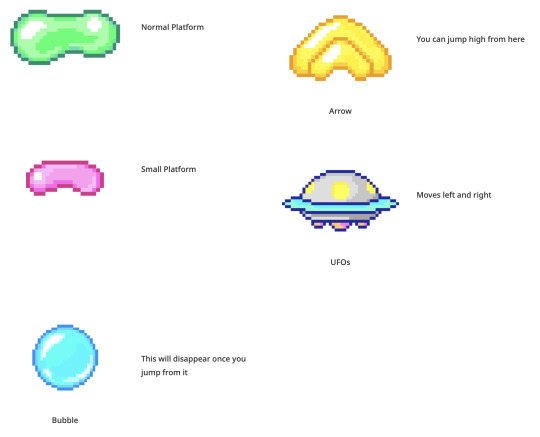
There are different types of platforms you can land on, so be careful not to fall! This includes a normal platform, arrow, small platform, UFOs, and lastly bubbles. The object will disappear once you jump from it.
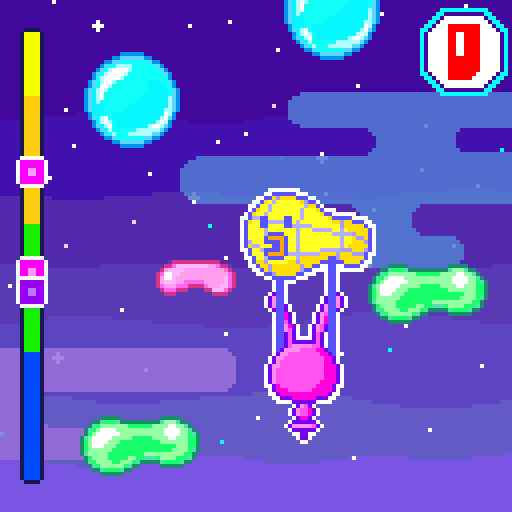
A countdown will show up for the last 10 seconds, and the game is over when it reaches 0 seconds remaining. How many Tama-feet can you jump?

The event starts on Tuesday, September 12th at 14:00 JST through Tuesday, September 19th, 2023 13:59 JST. The results will be calculated from Tuesday, September 19th, 2023 14:00 JST through Thursday, September 21st, 13:59 JST. Rewards will be distributed at the Tama Arena from Thursday, September 21st, 2023 14:00 JST through Friday, September 29th, 13:59 JST.
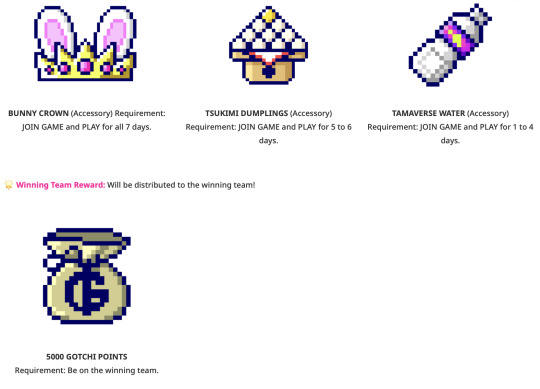
Rewards are all about how many days you play for, and if you’re on the winning team. The bunny brown is reward you’ll earn if you play for all 7 days, the Tsukimi dumplings is the reward you’ll earn for playing 5 to 6 days, and Tamaverse water is the reward you’ll earn for playing 1 to 4 days. It is important to note you’ll only earn one reward based on how many days you’ve played, not all rewards collectively.
Lastly, the winning team will get 5,000 Gotchi points! Wishing you the best of luck!
The update also includes miscellaneous bug fixes.
Be sure to update your Tamagotchi Uni to 1.2.6 today! Here’s how you can update: Main Menu -> Network Icon -> Update -> Check -> Check For Updates -> Yes. Enjoy the latest version of Tamagotchi Uni, it just keeps getting better.
#tamapalace#tamagotchi#tmgc#tamagotchiuni#tamagotchi uni#uni#tamatag#virtualpet#bandai#update#1.2.6#bunnyjump#bunny jump
20 notes
·
View notes
Text
Round 1 Stage 2 Poll 6


Cathmoíra, Domunas: Cathmoíra was a pre-Calamity city in the continent formerly known as Domunas, now the Shattered Teeth. It is a sister city and docking point for the floating city Avalir.
Alfield, Wildemount: Alfield is a small farming village in the Dwendalian Empire. The Mighty Nein helped them with a gnoll problem, and passed through multiple times afterwards.
image from crit recap animated
#exandria#cathmoíra#alfield#domunas#wildemount#cathmoira#shattered teeth#critical role#poll post#notpollprop#exandria city showdown#round 1#1.2.6
3 notes
·
View notes
Text
Round 2, Matchup 12: I.ii.6 vs IV.ix.1
72 notes
·
View notes
Text
One thing I love about Jean Valjean’s pre-prison backstory chapter is how human/flawed he is: he’s not an all-loving saint, but a regular guy taking on the duty of caring for his family even when when he has a lot of resentment about the burden that’s been placed on him. He’s not special. He’s an average guy and average criminal. His name literally means “voila gens”/“here is the man;” he’s an ordinary John Doe.
This is something I’ve noticed adaptations tend to change: they often want Jean Valjean to be unique, better than the other criminals in a way that makes him an Exception, a special person who doesn’t deserve to be lumped in with other criminals, and they want his arrest to be the system making a mistake rather than the system working as designed. But the novel is very clear that there is nothing special about Jean Valjean’s story, that he is not exceptional, and that he is a representative of a very common story and a very average kind of person.
I go back and forth on the description of young Jean Valjean sometimes, because on one hand, I do think Hugo has some classist ideas about peasants— but on the other hand, I really do like the characterization of Jean Valjean caring for his family while also being a regular person who feels overburdened by them, as anyone would. He protects his sister’s children by spending money they can’t afford on milk they’ve stolen, but he does it grumblingly. He spends all of his time working the same job that killed his father in order to support his family; but the narration points out he has no time to do normal young person things like falling in love, and he seems to exist without really believing he has any kind of future. He’s not this Ideal of Fatherhood—- he’s just a regular ordinary guy doing what he can to support his family even when he resents the weight that’s placed on him.
And despite all of his suffering under that weight, he still takes it on— and he still breaks down sobbing over his family when he’s parted from them:
While the bolt of his iron collar was being riveted behind his head with heavy blows from the hammer, he wept, his tears stifled him, they impeded his speech; he only managed to say from time to time, “I was a tree-pruner at Faverolles.” Then still sobbing, he raised his right hand and lowered it gradually seven times, as though he were touching in succession seven heads of unequal heights, and from this gesture it was divined that the thing which he had done, whatever it was, he had done for the sake of clothing and nourishing seven little children.
And his first escape attempt also happens shortly after he’s told the only news he ever hears of his family.
So again, I think this is also something I think a lot of adaptations miss: Pre-Prison Valjean is not a saintly hero who’s “mistaken” for an average criminal. He’s a very common type of person with a very common type of tragedy:
It is always the same story. These poor living beings, these creatures of God, henceforth without support, without guide, without refuge, wandered away at random,—who even knows?—each in his own direction perhaps, and little by little buried themselves in that cold mist which engulfs solitary destinies; gloomy shades, into which disappear in succession so many unlucky heads, in the sombre march of the human race.
135 notes
·
View notes
Text
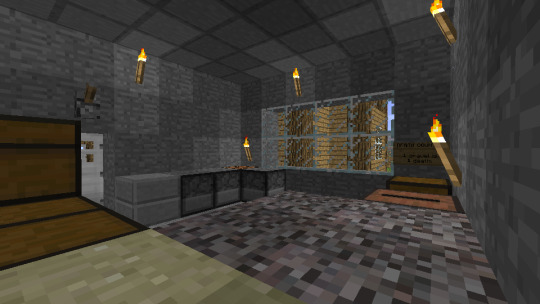
Wake up.
#Minecraft Alpha#Minecraft Alpha 1.2#Alpha 1.2.6#The Halloween Update#old Minecraft#retro Minecraft#Taken in 2024#how you do beds in Minecraft Alpha#“Normal” beds were added in Beta#weird Minecraft image#Wake Up#Minecraft interior#Mineblr
35 notes
·
View notes
Text
Here comes the story of the mysterious ex-convict Jean Valjean. If I had to compile the top three saddest episodes involving Jean Valjean, this one would definitely be among them. His story includes another example of touching sibling relationships, where they take turns taking care of each other. His sister’s story is another illustration of the harmful outcome of society’s insistence on women’s absolute dependence on men (and the absence of birth control: seven children in just eight years!)
Valjean’s care for his sister’s children—the way he doesn’t mind giving the best pieces of his food to them, the way he pays for the milk to cover up their trick, etc.—foreshadows him being a good caregiver to Cosette. And the most heartbreaking part of this chapter:
he wept, his tears stifled him, they impeded his speech; he only managed to say from time to time, “I was a tree-pruner at Faverolles.” Then still sobbing, he raised his right hand and lowered it gradually seven times, as though he were touching in succession seven heads of unequal heights, and from this gesture it was divined that the thing which he had done, whatever it was, he had done for the sake of clothing and nourishing seven little children.
The court, not seeing the need to provide for a big family as a mitigating circumstance, forever imposed this attitude on Valjean, who will never even mention mitigating circumstances concerning this or other episodes of his life. “There occur formidable hours in our civilization; there are moments when the penal laws decree a shipwreck. What an ominous minute is that in which society draws back and consummates the irreparable abandonment of a sentient being!” Another similar case was that of Claude Gaux, which Hugo knew too well and mentioned in his short digression.
Valjean’s poaching is mentioned! It is a very important reference for the barricade section of the book, don’t forget about it. Concerning poaching, I would like to add that this “crime” only existed because of the unfair expropriation of forests by lords.
“Jean Valjean had entered the galleys sobbing and shuddering; he emerged impassive. He had entered in despair; he emerged gloomy.” That’s a sad summary of what happened to Valjean after he lost and made himself forget his family.
52 notes
·
View notes
Text
Jean Valjean
Les Mis Letters reading club explores one chapter of Les Misérables every day. Join us on Discord, Substack - or share your thoughts right here on tumblr - today's tag is #lm 1.2.6
Towards the middle of the night Jean Valjean woke.
Jean Valjean came from a poor peasant family of Brie. He had not learned to read in his childhood. When he reached man’s estate, he became a tree-pruner at Faverolles. His mother was named Jeanne Mathieu; his father was called Jean Valjean or Vlajean, probably a sobriquet, and a contraction of <i>voilà</i> Jean, “here’s Jean.”
Jean Valjean was of that thoughtful but not gloomy disposition which constitutes the peculiarity of affectionate natures. On the whole, however, there was something decidedly sluggish and insignificant about Jean Valjean in appearance, at least. He had lost his father and mother at a very early age. His mother had died of a milk fever, which had not been properly attended to. His father, a tree-pruner, like himself, had been killed by a fall from a tree. All that remained to Jean Valjean was a sister older than himself,—a widow with seven children, boys and girls. This sister had brought up Jean Valjean, and so long as she had a husband she lodged and fed her young brother.
The husband died. The eldest of the seven children was eight years old. The youngest, one.
Jean Valjean had just attained his twenty-fifth year. He took the father’s place, and, in his turn, supported the sister who had brought him up. This was done simply as a duty and even a little churlishly on the part of Jean Valjean. Thus his youth had been spent in rude and ill-paid toil. He had never known a “kind woman friend” in his native parts. He had not had the time to fall in love.
He returned at night weary, and ate his broth without uttering a word. His sister, mother Jeanne, often took the best part of his repast from his bowl while he was eating,—a bit of meat, a slice of bacon, the heart of the cabbage,—to give to one of her children. As he went on eating, with his head bent over the table and almost into his soup, his long hair falling about his bowl and concealing his eyes, he had the air of perceiving nothing and allowing it. There was at Faverolles, not far from the Valjean thatched cottage, on the other side of the lane, a farmer’s wife named Marie-Claude; the Valjean children, habitually famished, sometimes went to borrow from Marie-Claude a pint of milk, in their mother’s name, which they drank behind a hedge or in some alley corner, snatching the jug from each other so hastily that the little girls spilled it on their aprons and down their necks. If their mother had known of this marauding, she would have punished the delinquents severely. Jean Valjean gruffly and grumblingly paid Marie-Claude for the pint of milk behind their mother’s back, and the children were not punished.
In pruning season he earned eighteen sous a day; then he hired out as a hay-maker, as laborer, as neat-herd on a farm, as a drudge. He did whatever he could. His sister worked also but what could she do with seven little children? It was a sad group enveloped in misery, which was being gradually annihilated. A very hard winter came. Jean had no work. The family had no bread. No bread literally. Seven children!
One Sunday evening, Maubert Isabeau, the baker on the Church Square at Faverolles, was preparing to go to bed, when he heard a violent blow on the grated front of his shop. He arrived in time to see an arm passed through a hole made by a blow from a fist, through the grating and the glass. The arm seized a loaf of bread and carried it off. Isabeau ran out in haste; the robber fled at the full speed of his legs. Isabeau ran after him and stopped him. The thief had flung away the loaf, but his arm was still bleeding. It was Jean Valjean.
This took place in 1795. Jean Valjean was taken before the tribunals of the time for theft and breaking and entering an inhabited house at night. He had a gun which he used better than any one else in the world, he was a bit of a poacher, and this injured his case. There exists a legitimate prejudice against poachers. The poacher, like the smuggler, smacks too strongly of the brigand. Nevertheless, we will remark cursorily, there is still an abyss between these races of men and the hideous assassin of the towns. The poacher lives in the forest, the smuggler lives in the mountains or on the sea. The cities make ferocious men because they make corrupt men. The mountain, the sea, the forest, make savage men; they develop the fierce side, but often without destroying the humane side.
Jean Valjean was pronounced guilty. The terms of the Code were explicit. There occur formidable hours in our civilization; there are moments when the penal laws decree a shipwreck. What an ominous minute is that in which society draws back and consummates the irreparable abandonment of a sentient being! Jean Valjean was condemned to five years in the galleys.
On the 22d of April, 1796, the victory of Montenotte, won by the general-in-chief of the army of Italy, whom the message of the Directory to the Five Hundred, of the 2d of Floréal, year IV., calls Buona-Parte, was announced in Paris; on that same day a great gang of galley-slaves was put in chains at Bicêtre. Jean Valjean formed a part of that gang. An old turnkey of the prison, who is now nearly eighty years old, still recalls perfectly that unfortunate wretch who was chained to the end of the fourth line, in the north angle of the courtyard. He was seated on the ground like the others. He did not seem to comprehend his position, except that it was horrible. It is probable that he, also, was disentangling from amid the vague ideas of a poor man, ignorant of everything, something excessive. While the bolt of his iron collar was being riveted behind his head with heavy blows from the hammer, he wept, his tears stifled him, they impeded his speech; he only managed to say from time to time, “I was a tree-pruner at Faverolles.” Then still sobbing, he raised his right hand and lowered it gradually seven times, as though he were touching in succession seven heads of unequal heights, and from this gesture it was divined that the thing which he had done, whatever it was, he had done for the sake of clothing and nourishing seven little children.
He set out for Toulon. He arrived there, after a journey of twenty-seven days, on a cart, with a chain on his neck. At Toulon he was clothed in the red cassock. All that had constituted his life, even to his name, was effaced; he was no longer even Jean Valjean; he was number 24,601. What became of his sister? What became of the seven children? Who troubled himself about that? What becomes of the handful of leaves from the young tree which is sawed off at the root?
It is always the same story. These poor living beings, these creatures of God, henceforth without support, without guide, without refuge, wandered away at random,—who even knows?—each in his own direction perhaps, and little by little buried themselves in that cold mist which engulfs solitary destinies; gloomy shades, into which disappear in succession so many unlucky heads, in the sombre march of the human race. They quitted the country. The clock-tower of what had been their village forgot them; the boundary line of what had been their field forgot them; after a few years’ residence in the galleys, Jean Valjean himself forgot them. In that heart, where there had been a wound, there was a scar. That is all. Only once, during all the time which he spent at Toulon, did he hear his sister mentioned. This happened, I think, towards the end of the fourth year of his captivity. I know not through what channels the news reached him. Some one who had known them in their own country had seen his sister. She was in Paris. She lived in a poor street near Saint-Sulpice, in the Rue du Gindre. She had with her only one child, a little boy, the youngest. Where were the other six? Perhaps she did not know herself. Every morning she went to a printing office, No. 3 Rue du Sabot, where she was a folder and stitcher. She was obliged to be there at six o’clock in the morning—long before daylight in winter. In the same building with the printing office there was a school, and to this school she took her little boy, who was seven years old. But as she entered the printing office at six, and the school only opened at seven, the child had to wait in the courtyard, for the school to open, for an hour—one hour of a winter night in the open air! They would not allow the child to come into the printing office, because he was in the way, they said. When the workmen passed in the morning, they beheld this poor little being seated on the pavement, overcome with drowsiness, and often fast asleep in the shadow, crouched down and doubled up over his basket. When it rained, an old woman, the portress, took pity on him; she took him into her den, where there was a pallet, a spinning-wheel, and two wooden chairs, and the little one slumbered in a corner, pressing himself close to the cat that he might suffer less from cold. At seven o’clock the school opened, and he entered. That is what was told to Jean Valjean.
They talked to him about it for one day; it was a moment, a flash, as though a window had suddenly been opened upon the destiny of those things whom he had loved; then all closed again. He heard nothing more forever. Nothing from them ever reached him again; he never beheld them; he never met them again; and in the continuation of this mournful history they will not be met with any more.
Towards the end of this fourth year Jean Valjean’s turn to escape arrived. His comrades assisted him, as is the custom in that sad place. He escaped. He wandered for two days in the fields at liberty, if being at liberty is to be hunted, to turn the head every instant, to quake at the slightest noise, to be afraid of everything,—of a smoking roof, of a passing man, of a barking dog, of a galloping horse, of a striking clock, of the day because one can see, of the night because one cannot see, of the highway, of the path, of a bush, of sleep. On the evening of the second day he was captured. He had neither eaten nor slept for thirty-six hours. The maritime tribunal condemned him, for this crime, to a prolongation of his term for three years, which made eight years. In the sixth year his turn to escape occurred again; he availed himself of it, but could not accomplish his flight fully. He was missing at roll-call. The cannon were fired, and at night the patrol found him hidden under the keel of a vessel in process of construction; he resisted the galley guards who seized him. Escape and rebellion. This case, provided for by a special code, was punished by an addition of five years, two of them in the double chain. Thirteen years. In the tenth year his turn came round again; he again profited by it; he succeeded no better. Three years for this fresh attempt. Sixteen years. Finally, I think it was during his thirteenth year, he made a last attempt, and only succeeded in getting retaken at the end of four hours of absence. Three years for those four hours. Nineteen years. In October, 1815, he was released; he had entered there in 1796, for having broken a pane of glass and taken a loaf of bread.
Room for a brief parenthesis. This is the second time, during his studies on the penal question and damnation by law, that the author of this book has come across the theft of a loaf of bread as the point of departure for the disaster of a destiny. Claude Gaux had stolen a loaf; Jean Valjean had stolen a loaf. English statistics prove the fact that four thefts out of five in London have hunger for their immediate cause.
Jean Valjean had entered the galleys sobbing and shuddering; he emerged impassive. He had entered in despair; he emerged gloomy.
What had taken place in that soul?
10 notes
·
View notes
Text
Today's Les Mis chapter describes Jean Valjean's sentencing and subsequent journey as a part of a chain gang to the galleys of Toulon. Published from 1782-1788, Louis-Sébastien Mercier's work, "Tableau de Paris" is a multi-volume book in which he paints a picture of all aspects of Paris and Parisian life. Here are some excerpts from his eye-witness account of a typical galley chain gang leaving Paris:
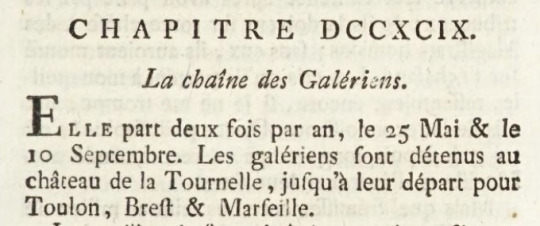
"The Chain of Galley-slaves.
It leaves twice a year, on May 25th and September 10th. The galley slaves are held at the Château de la Tournelle until their departure for Toulon, Brest, and Marseille."
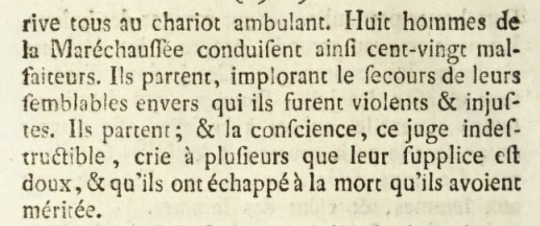
"On the departure day they are placed in long carriages. The same chain connects and binds them all to the wagon. Eight policemen lead 120 wrongdoers this way. They leave, imploring help from their fellow people, towards whom they were violent and unjust. They leave; and the conscience, that indestructible judge, cries to many that their torture is light, and that they escaped the death that they have merited."
Mercier then goes on to ruminate on his feelings seeing the men bound for the galleys:
"Oh! How I would like to be able to read to the depths of their soul which is the most criminal or the most innocent! I would like to know why, how, and to what degree they have shown contempt to virtue. Is there, in these individuals, as in others, an equal balance of virtue and vice? Human laws are so heavy handed! And then is the moral perfection of society possible, and to what point?"
Noticing an older man in particular, he wonders how he came to be there, with some distinct parallels to Jean Valjean:
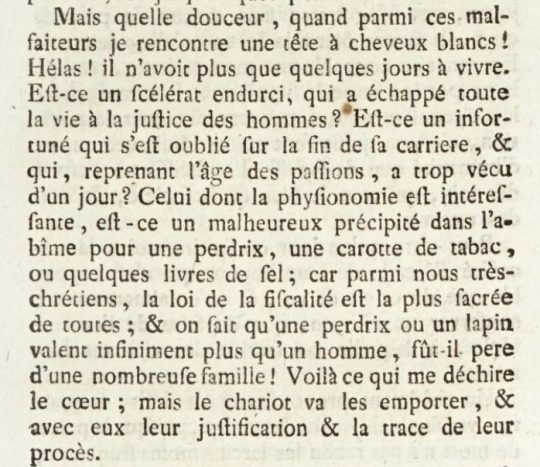
"Is he a hardened criminal who has escaped the justice of men all his life? … Is he a poor soul thrown into the abyss for a partridge, a pinch of tobacco, a few pounds of salt; for among us Christians, the law of taxation is the most sacred of all; and we know that a partridge or a rabbit is worth infinitely more than a man, even if he is the father of a large family! This is what tears my heart, but the wagon is going to take them away, and with them their justification and the mark of their trial."
He ends with his views on the death penalty and the morality of sentencing men to such a fate for these crimes:

"Maybe one day we will feel it less necessary to take away the life of a man who is only guilty of the crime of theft, and rather conserve a citizen than make of gold an idol to which we sacrifice human victims."
The volume of Tableau de Paris that contains these excerpts can be found on the Internet Archive.
26 notes
·
View notes
Text
Narrative Voice in LM 1.2.X
I think it's rather interesting how a bunch of Hugo's different approaches and techniques show up back-to-back in the early parts of book 2 here. In 1.2.1, for instance, he's keeping to a third-person-omniscient perspective: he's describing the speech and actions that any observer in the room would have seen, but also peppering in details as-of-yet unknown to the characters (such as that Myriel's great work on duty will never be completed).
We also see Hugo insert himself into the narration, suggesting particular documents or persons were sources of his information, as though Hugo was researching and reconstructing the story from primary sources and testimony: there's Mlle Baptistine's letters cited as the source of 1.2.4 (which also allows Hugo to use her perspective to narrate the dinner); the reference to the prison turnkey as witness of Valjean's chaining in 1.2.6 (to show the lasting emotional impact of the scene on a witnes); in the same chapter, the narrator references "my research" to allow a comparison between Valjean and Claude Gaux. I think this conceit of Hugo-as-historic-researcher reinforces the idea that it's a realistic novel: that the characters and plots are accurate representations of real people the idea that Les Mis is an everyman (/woman/child) story that could be about any unfortunate people and thus is about all of them. Furthering that idea, I find the citation of fake sources lends credence to certain details which Hugo includes in the narrative, which likewise could have been "reconstructed" from later sources, even if not named (the "small papers and large book" detail could have come from Hugo inspecting Myriel's notes and books in an archive, Valjean's escape attempts and subsequent punishments would have been documented somewhere in the prison records). Dropping unsourced 'facts' into the narrative ("four out of five crimes in London* are based on hunger"), also subtly reinforces the idea of the story as some sort of derived historic narrative.
However, we are in the realm of fiction, and Hugo-as-omniscient-narrator also freely includes tiny details of the exact scene itself as experienced by the characters in that moment, which would not be recoverable and are unlikely to be documented: the exact identity of the woman who pointed Valjean to the bishop's house, which was unknown to him and thus not reported to the "witness" for the scenes in the bishop's house; the depiction of Jeanne's young son sleeping on his basket or hugging the cat for warmth while waiting for school (an unlikely detail for Valjean to hear about in prison, which is ostensibly the context for the end of Jeanne's story); really the whole of Valjean's early history is full of these sorts of lost details (Marie-Claude giving the children milk and the girls spilling it in their haste to drink? Who would even have that information for Hugo-the-researcher to discover?)
And then we have 1.2.8: an extended metaphor of drowning as a representation for how poverty and incarceration cut Jean Valjean off from society. Hugo gets a certain amount of (affectionate) flack for interrupting the plot of Les Mis with digressions: seemingly unrelated essays and short interludes of real-person fiction. Hugo-the-author uses them to insert his social/political/historical opinions and develop his theses for the books, as well as setting scenes for later events in the plot, calling for political action by the audience, wrestling with his own past, and boring the censors.
*Also, referencing London make this message both more universal and (I imagine) less biting to contemporary French readers. Sure, other than this one sentence Hugo's only talking about French people and crimes committed in France, but dropping in this statistic about English crime supports his "desperation causes crime" message while also drawing off the criticism of French society/law a little. This tidbit is about those guys (who you-the-reader may be annoyed with re: the whole losing the Napoleonic wars thing) over there, not more woe at home! They do it, too! It's not just you and your society. Or something.
26 notes
·
View notes
Text

☀ SHRI KRISHNA ॐ ☀
“The supreme occupation [dharma] for all humanity is that by which men can attain to loving devotional service unto the transcendent Lord. Such devotional service must be unmotivated and uninterrupted to completely satisfy the self."~Srimad Bhagavatam 1.2.6
21 notes
·
View notes
Text
my house :)

decided to make a world starting in ye olden minecraft (alpha 1.2.6), where I will set a goal for myself (which will usually be building with new blocks that were introduced in that version related) to accomplish in each version before I can update the world to the next major release ! I think the starting house I made for this looks nice so wanted to share :)
#words of nora#minecraft#idea was vaguelly based off of evo smp & puffingfish's unobtained youtube series !
6 notes
·
View notes
Text
Round 1, Matchup 20: I.ii.6 vs III.ii
5 notes
·
View notes
Text

i'm always thinking about the prologue and les mis' relevance to our current world, but something about this particular passage in 1.2.6 strikes me. the mundanity of it, the ease with which this is allowed to happen. how obvious it is that it still happens. i don't know. what's left to do but wait for the day where les mis become irrelevant.
#there's a lot of misery in this book! did you know??#les mis letters#sorry for always being behind. im so sleepy all the timem#🤎
41 notes
·
View notes
Text

#cursed#cursed version#liminal Minecraft#Minecraft Alpha#Minecraft Alpha 1.2#2010 Minecraft#Taken in 2024#Taken Today#weird Minecraft image#Minecraft screenshot#weird Minecraft#The Halloween Update#Alpha 1.2.6#upstairs#Minecraft house
23 notes
·
View notes
Text
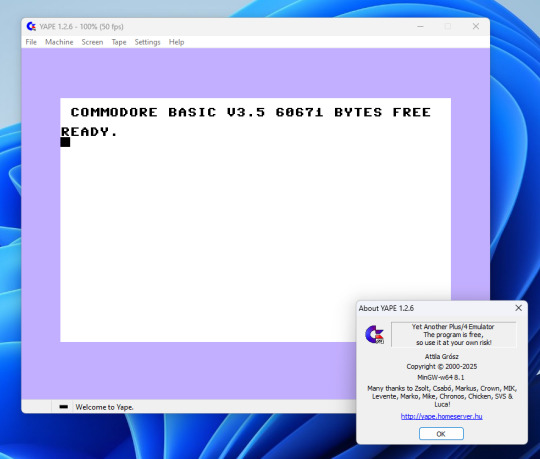
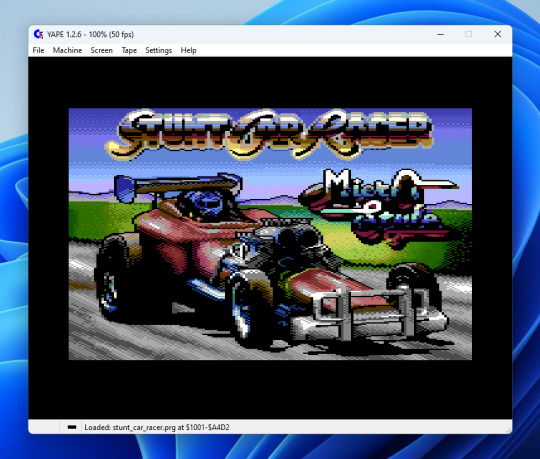
Commodore Plus/4 Emulator YAPE 1.2.6 released
D82 image support in IEC mode
automatic line feed bug fixed in MPS801/803 mode
re-enabled attach disk image in 1551 mode
sound device selection fix
TED sound frequency regression fix
monitor opcode cache clear on memory overwrite
#commodore#retro#vintage#classic#retrogaming#videogames#cbm#8bit#emulation#emulator#c16#c116#cplus/4#windows
5 notes
·
View notes
Text
Café Noir Update 1.2.6 is live!!

This includes Corbin's Date 1, and is officially the end of the demo!! Next update for this game (other than any little minor tweaks I come across) will be the full version of the game! The full version will have updated art (sprites, backgrounds, CGs, etc), updated GUI, an implemented relationship meter, and full routes for all 11 characters (+2 secret routes).
Thank you anyone who has kept up with me and my slow ass progress, I really hope that the full game doesn't take too too long to be released. I love you guys! ♡
[ Demo only available on PC! ]
6 notes
·
View notes